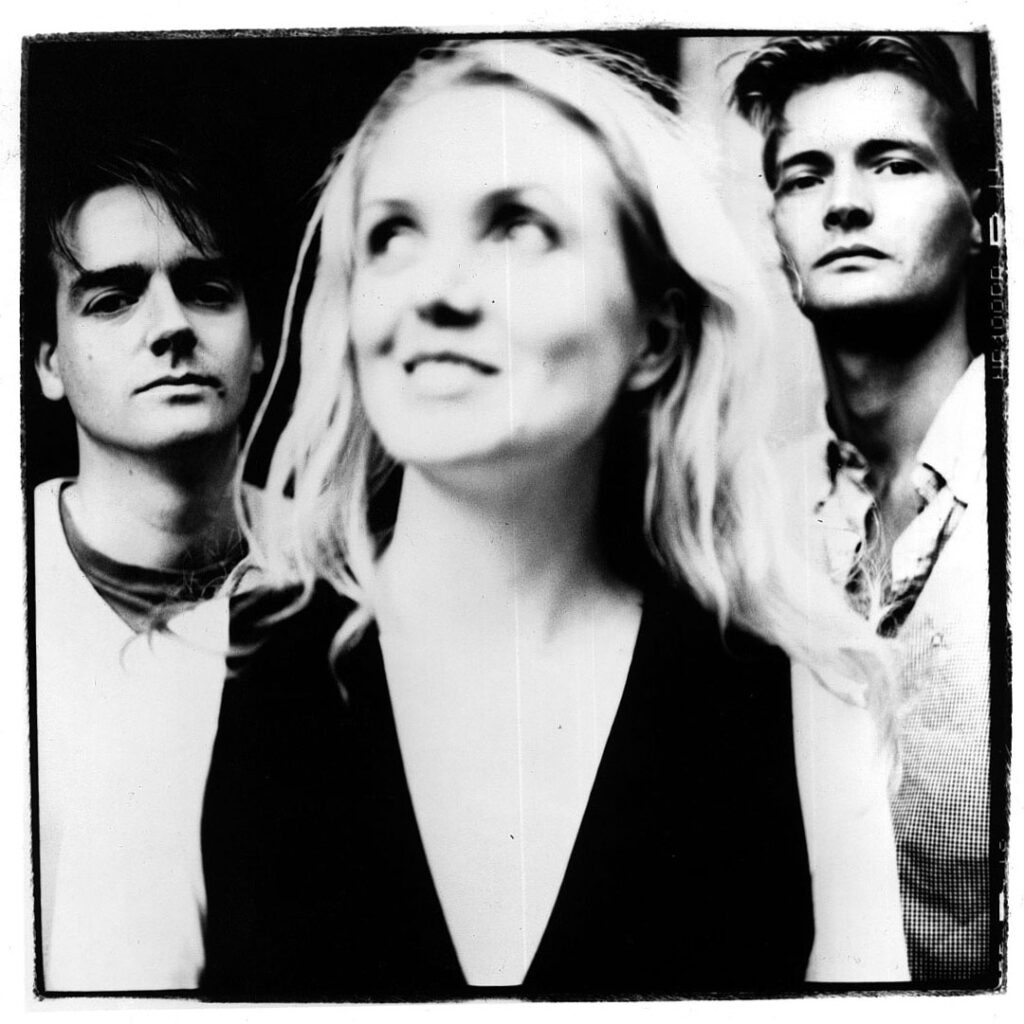Few bands survive being swallowed whole by the music industry, but south London’s ever-inventive sonic tinkerers ROC are thankfully made of sterner stuff
You couldn’t make it up. It’s a tale with a roll call that includes Brian Eno, Nirvana, Radiohead, U2, Bryan Ferry and the Spice Girls. There are hysterical lawyers, absent managers and smarting label bosses. There are threats, rows and broken promises.
At the centre of it all are ROC, a south London-based three-piece whose canon is, these days, something of a best-kept secret. The band have just reissued their eponymous debut album, a record that has earned its day in the sun several times over since its original release in January 1996. The first time round, it garnered rave reviews yet sunk almost without trace, its re-release being prevented until now.
‘ROC’ is a huge record, packing full-formed songs against tidal waves of sonic invention. The machines pile up and up and up, forming rich swathes of bruised and swollen sound over which the trio of Fred Browning, Patrick Nicholson and Karen Sheridan pour traditional instruments and sublime vocals.
Sometimes it sounds like wrestling a runaway truck, sometimes like having your neck kissed by angels. From the distorted, stomping space rock of ‘Excised’ to the life-affirming wah-wah romp of ‘Hey You Chick’, from the stone-cold should-have-been-a-hit of ‘I Want You I Need You I Miss You’ to the hands-in-the-air floorfiller that is ‘Balloon’, it is a remarkable debut.
More remarkable is that it actually exists, all things considered.
ROC, or Reincarnation Of Christ as they started life in 1983, were Fred Browning’s high school band. Couldn’t play a note between them. But spurred on by a love of Cabaret Voltaire and Throbbing Gristle, they’d walk around recording footsteps or break into the school music rooms looking for anything they could use, with the results being bounced from cassette tape to cassette tape.
Patrick Nicholson was, according to Fred, “in the cool band at school”. Suburban Relapse, named after the Siouxsie And The Banshees song, turned in straight-up Ramones punk. But it wasn’t long before ambition overtook ability and Fred hand-picked the best musicians in Suburban Relapse, including Patrick, for ROC. Meanwhile, several thousand miles away across the Atlantic in Colorado, Karen Sheridan, whose parents had emigrated to America from Glasgow when she was eight, was also beginning to get caught up.
“I was at gigs constantly,” says Karen. “I desperately wanted to be in a band, but I couldn’t play anything either. I was probably given a bass by one of the guys I was seeing and I just learnt to play it.”

While her all-girl outfit Your Funeral set about working up a head of steam, ROC began tinkering.
“It was not actually a band standing around playing instruments,” recalls Patrick. “I just remember a floor covered in lots of gear all connected up and ending up in a cassette player. I always thought ROC was the joke group I was in. I had my own band who were trying terribly hard to get somewhere so I didn’t really notice that ROC was calmly, without really thinking about it, acquiring a bunch of material.”
“There was no pressure,” says Fred. “We were at universities all over the country and we used to get together in the summer holidays. Play live? Why? Let’s make tapes. I couldn’t care less who was interested.”
Meanwhile, Karen had left school and, after toying with a move to California, the lure of the British music scene proved decisive and she headed for London, meeting Patrick when they worked in the same King’s Road restaurants. Both The Stockpot and The Chelsea Kitchen provided some rich pickings for ROC.
“I met this guy in The Chelsea Kitchen,” remembers Patrick. “He had a friend who was the Ents Secretary at Warsaw University. He had this little tour circuit, but he was struggling to find artists to play it, so I dropped out of uni and went into business sending UK bands out there.”
ROC headed to Warsaw themselves in 1987, playing “proper” songs as a traditional band, the core of which had settled as Fred, Patrick and singer Mark Harris. Karen, a keen photographer, went along to document the ride.
“After Poland and our attempt at writing normal-ish songs stopped, Mark went his own way and we just let it slide for a couple of years,” says Fred. “Then Patrick met up with an old friend from school.”
Pete Burgess was something of a technical guru and he’d just set up his own recording studio, Pointy House in Brixton, which quickly became a home-from-home for ROC.
“He could actually do the stuff we were trying to do in our heads,” says Patrick, “It was all instrumental to start with, lots of cut-ups and sampled voices, and then gradually Fred began to add vocals.”
“We came up with a tune one day and thought, ‘Why don’t we get a girl to sing it?’,” says Fred. “Karen was the obvious choice.”
The final piece in the jigsaw was Russell Warby, who Patrick knew from his King’s Road days. As well as being in ROC, Russell was making his way as a live booking agent. Had a band from the States who were doing quite well. Nirvana. It was through Russell that ROC landed a publishing deal with Silvertone – and with it came studio time that allowed a final polish before the big push.
Ten years after they had started back in school, ROC finally released their debut single, ‘Dead Step’, in December 1993. Four further singles, all issued on their own Little Star label, followed in just 10 months, making them seem rather prolific. Some of the tracks weren’t exactly new, though.
“‘Girl With A Crooked Eye’ was written in 1984 or 1985,” offers Fred. “‘White Stains’ was probably from around the same time too.”
“The material was just what we’d built up,” says Patrick. “So we existed in this messy way, from being at school, going to university, arsing about in London in our early 20s, to just beginning to actually sort of…”
And trail off he might.
At the back end of last century, pre-internet, there was still gold in them there music industry hills. A whirlwind whipped around anything that stood a chance of making a buck. Following ROC’s debut single, Bryan Ferry’s management company picked up on the band.
“One thinks, foolishly, that these guys are going to make things happen,” says Patrick. “There were lots of very important meetings and lots of coming up with nothing. And then Setanta Records approached us directly. Our management were saying it was a very good idea and we were going, ‘So what have you done about it?’.”
“I couldn’t relate to the Chelsea-fabulous world of Bryan Ferry,” offers Karen. “It just felt really… weird. The kind of band we were, I don’t know how much they would have been able to do for us anyway.”
So a manager-less ROC ended up at Setanta, home to Edwyn Collins, who had swelled the label’s coffers considerably with his worldwide hit ‘A Girl Like You’. It must have seemed like, ‘OK, here we go’.
“It was difficult, business-wise,” concedes Karen, choosing her words carefully. “We were making demos with Pete and Russell, but different projects began pulling them away. Russell was doing very well with Nirvana and then there were Pete’s commitments at Pointy House.”
“The band was slimming down to what it needed to be,” adds Patrick. “And that involved saying goodbye to people who weren’t particularly happy about it at the time. We’re all friends now, but…”

Despite the upheaval, the end result was the group’s extraordinary debut album. Musically, the trio grew up on a diet of ‘Top Of The Pops’, ‘Top Of The Pops’ and more ‘Top Of The Pops’. A weekly fix of hits, the half-hour blast would veer wildly from The Sweet to The Jacksons, from Boney M to Bowie. Punk sat alongside folk, pop next to country and western. For bands of a certain age, that wild diversity is deeply ingrained. It’s little surprise that pinning down what ‘ROC’ sounds is like nailing jelly to sea water.
“We hadn’t worked with a producer before and Danton Supple was a huge part of that album,” says Patrick. “He was the chief engineer for Trevor Horn and Steve Lillywhite and we were one of his first jobs as a producer. The idea of assembling a record with sounds that weren’t doing what they were supposed to be doing was complete fucking magic.”
“We initially played him our demo cassettes,” says Karen, “If I’d have heard them, I don’t think I would have grasped it, but Danton got it right away. At the same time that he was producing us, he was also working with Brian Eno and U2 in Dublin. I think we even get a mention in Eno’s diaries.”
Danton Supple went on to produce the likes of Coldplay and Kylie Minogue. But he also worked with ROC on their second and third albums, as well as recently producing the band’s new EP, which is due for release early next year.
“So we’d made our record and Setanta were very pleased with it,” says Patrick. “And then the clock is ticking between finishing the recording and the actual release date. The label keep putting it back and they also aren’t forthcoming with our contract. So we’re getting a bit anxious and we start talk to lawyers. They were, ‘OH MY GOD, YOU NEED TO GET THEM TO SORT THIS OUT’! They were rather hysterical about it, not a calm voice, and then the news gets out that all is not well between us and the label.”
When the album did eventually come out, it garnered rave reviews. And with word spreading that ROC could well be up for grabs, a bun fight kicked off for their services, which royally narked Setanta.
“We still didn’t have a manager and we were effectively dealing with a loose cannon,” says Fred. “The people around Keith Cullen [the Setanta boss] were amazing, but I don’t think Keith himself ever got us and the relationship rapidly went downhill.”
“He sent an all-points fax to the music industry,” explains Patrick. “Something like, ‘We are taking the unusual step of warning anyone who may be considering working with ROC… blah blah blah’. We thought it was great, it was quite the recommendation, but by then we already had a new record deal with Virgin anyway.”
‘ROC’, however, was pretty much dead in the water.
“Virgin were saying, ‘Don’t worry, we’ll buy it back and re-issue it’,” laughs Patrick. “We were saying, ‘This guy, whatever we think of him, runs a really successful record label, so don’t push him around’. And guess what? Keith said, ‘Fuck you’. I have to say that I completely understand why he did that, though.”
The story of ROC’s major label adventure and sophomore outing, 1997’s ‘Virgin’, is one for another time. Didn’t exactly go swimmingly. Selected highlights include being steamrollered by The Spice Girls and turning down a tour support for Radiohead, who are big ROC fans apparently.
But there is one final loose end to tie up. The ‘ROC’ reissue. More to the point, how did they wrestle the album from Setanta?
“ROC just kind of trucks along, much like it did in the early days,” notes Karen of the group’s apparent dormancy since the release of their third album, ‘Night Fold Around Me’, in 2006.
“Music gets made, but it’s a slow process,” says Patrick. “Then last year, this guy we know, Sean Hocking, who runs a label in Hong Kong called Metal Postcard, got in touch with us. He said, ‘I’ve got a plan, it’s time to reissue your first album’. And we said, ‘Good luck’.”
“Setanta closed in 2012,” says Fred. “So obviously our first album was dead money. Sean Hocking just rang Keith Cullen up.”
“Keith would have never have just given it to us,” says Patrick. “But the difference between what Sean bought it for and what Virgin were offering at the time is astonishing. Let’s not say how much…”
What sort of car would it buy?
“Not a major luxury car,” smiles Patrick. “But we’re still talking a very, very good car.”
And in the driving seat? ROC. You couldn’t make it up. Really.
The Holy Trinity: The Three Roc Albums (So Far)
‘ROC’ (Setanta, 1996)
It’s easy to listen ‘ROC’ now and hear a brave, innovative record. The thing to remember is that it arrived at a time when the UK music scene was getting all hot and bothered over Britpop, little of which was particularly brave or innovative but it sold by the mountain-load. Little wonder that ROC confounded those around them. Thank goodness, eh?
‘Virgin’ (Virgin, 1997)
The sound of a band brimming with confidence. Their new label, convinced they were getting an out-and-out pop band, clearly forgot to tell ROC. ‘Virgin’ veers delightfully from visceral straight-up belter (see the single, ‘Cheryl’) to glorious orchestral heartbreaker (‘Ocean And England’). The electronics are much more front and centre this time round too.
‘Night Fold Around Me’ (12 Apostles, 2006)
Almost a decade between releases? Worth the wait? What do you think? ROC started work on ‘Night…’ while still at Virgin, revisiting it and seeing it to completion in 2005. Older, wiser and without the full battle cry of the music industry fugging it up, this is a gentler record. Yet from ‘Soviva’, a spectacular killer of a tune, to ‘Singapore’, which builds from a whisper to a scream, it’s clear they’ve lost none of their bite.
‘ROC’ is out on Metal Postcard Records






